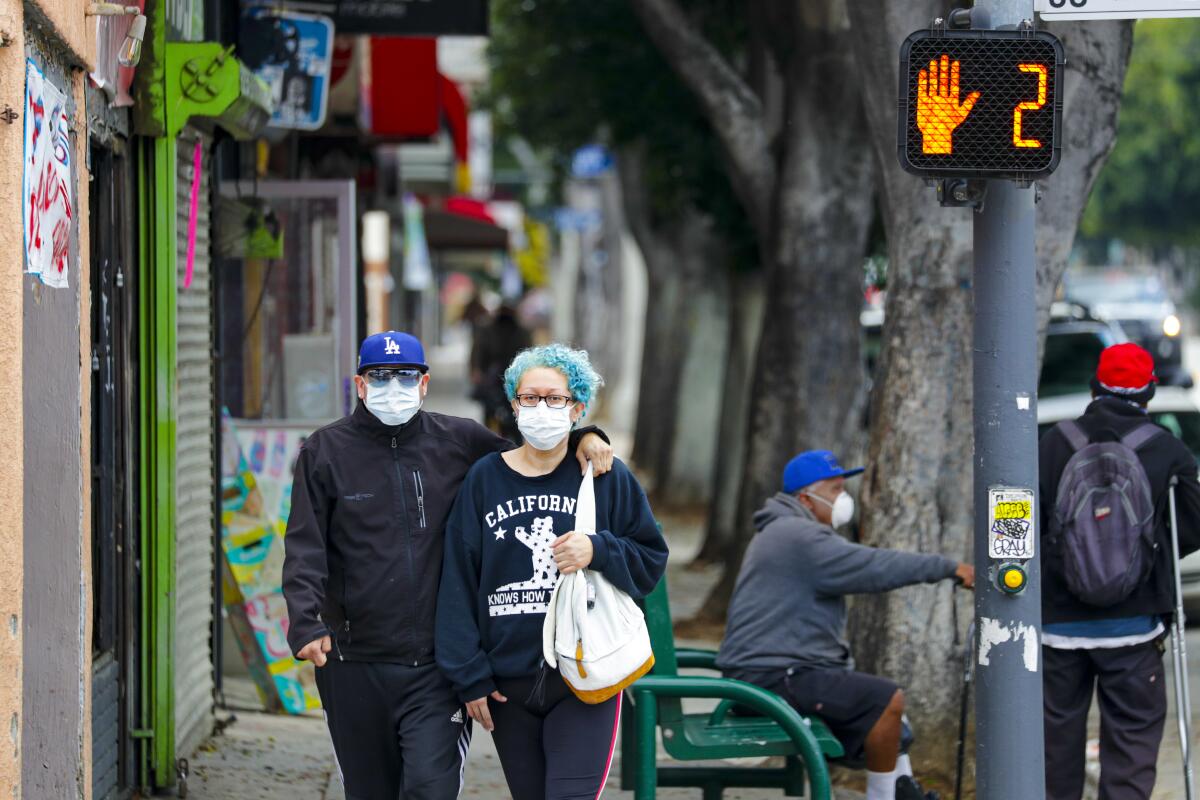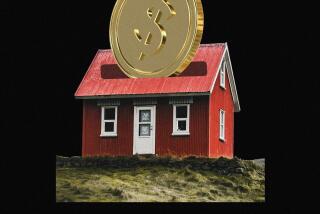Most L.A. households face serious financial problems amid coronavirus pandemic, poll finds

- Share via
A majority of Los Angeles households face serious financial problems due to the COVID-19 pandemic, with Latinos and Black residents bearing the brunt of the economic toll, according to a new poll conducted in the nation’s four largest cities.
Some 56% of households polled in the city of L.A. reported having such financial problems, including 64% of households with annual incomes below $100,000. The survey offers further proof that the heaviest effect of the outbreak has been felt by Black and Latino households, with 52% and 71%, respectively, of those groups polled in Los Angeles reporting “serious financial problems,” compared with 37% of white households.
The study found similar results among Black and Latino respondents in New York, Houston and Chicago, the three other cities examined.
“Billions of dollars came from the federal and state governments to protect our communities, yet what we see in four big cities is that more than 50% in these communities are reporting serious financial problems,” said Julie Morita, executive vice president of the Robert Wood Johnson Foundation, for which the poll was conducted alongside NPR and the Harvard T.H. Chan School of Public Health. “That’s significant. It means things like having to dip in or use all savings, difficulty paying other debt.”
Throughout the United States, Latinos and Black people disproportionately have been casualties of the virus.
Black and Latino residents and those living in lower-income neighborhoods have been among those hit hardest by the virus in Los Angeles County. Officials say that’s largely because of the limited access to testing in those communities at the start of the pandemic and the fact that many residents of those communities work in essential and high-risk settings, and they frequently lacked proper protective equipment, such as masks, before such gear was required.
Although they account for about 39% of the population in California, Latinos make up 60% of positive cases and 48% of deaths, according to the California Department of Public Health; during the peak of transmission in July, Black residents “had a rate at four deaths per 100,000 people,” county officials said at that time. That rate was three times that of white residents during the same time period.
“When we look at other public health emergencies, whether it’s other infectious diseases like measles or natural disasters like heat waves or hurricanes, what we see is communities of color, Black or Latino communities, hurt more significantly because of the structures and systems in place,” Morita said. “They have less to begin with, less cushion to support them in these times of stress.... They bear the brunt of the impacts.”
The poll, the first of five conducted by the researchers, surveyed 3,454 adults from July 1 to Aug. 3, including 512 adults in New York City, 507 in Los Angeles, 529 in Chicago and 447 in Houston. The margin of error is 3.3 percentage points overall, and 7.1 percentage points for Los Angeles.
Across the board, the majority of households in the four cities reported dire financial problems that hindered many aspects of their lives, including depleted savings and difficulty paying rent.
More than 1 in 3 respondents reported using up all or most of their savings, and 35% reported having serious problems paying their credit card bills, loans or other debt, the poll found. Nearly 3 in 10 reported serious problems paying their mortgage or paying their utility bills.
“It’s disheartening and concerning,” Morita said. “The key is how we look at policy going forward so we can prevent this being exacerbated. It’s an opportunity for governments to see what they can do better.”
The pandemic also has severely affected employment in L.A., with 61% of households reporting that a member has either lost a job, been furloughed or had wages or hours reduced since the start of the outbreak. Nationally, 46% of U.S. households report job or wage losses, according to the survey.
Saba Waheed, research director at the UCLA Labor Center, who was not involved in the survey, said the results reinforced the notion that the rapid spread of COVID-19 “made a lot of preexisting issues more visible.”
“People were already living paycheck to paycheck,” Waheed said, “and few families had the funds needed to cover a couple months of expenses.”
The data also point to potential pitfalls in government response to the pandemic, she said.
“On the one hand, the data was a wake-up call in terms of the structural inequality because the data clearly shows this falls hard on Black and Latino communities,” she said. “On the other hand, the CARES Act” — the $2.2-trillion economic stimulus bill passed by Congress and signed into law by President Trump last spring — “didn’t go far enough to support families. It fell short, and now you see the economic hardship families have to sustain because of that.”
In addition to financial hardships, many Angelenos have had difficulty with childcare. Nearly 70% of households with children surveyed reported serious problems caring for them. That included 52% who said they were having problems “keeping children’s education going,” and 39% who responded that they were having problems “helping children adjust to major changes in their lives,” according to the poll.
Some 54% of households with children said they were either having serious problems with their internet connection to do schoolwork or their jobs, or that they did not have a high-speed internet connection at home.
“These are serious problems, and this is not the first time this has happened,” Morita said. “It underscores the need to fix these structural challenges.”
More to Read
Sign up for Essential California
The most important California stories and recommendations in your inbox every morning.
You may occasionally receive promotional content from the Los Angeles Times.











